Napoleon III was President of France under the name Charles-Louis-Napoleon Bonaparte during the Second Republic from 1848 to 1852 and Emperor of France from 1852 to 1870 as Napoleon III.
Born: 20. April 1808, Paris
Died: 9 January 1873, Chislehurst, England
Royal Dynasties of Europe. France: Bonaparte.
Napoleon III
The premature death of Napoleon’s son cleared the way to the throne for the emperor’s nephew, Charles Louis Napoleon Bonaparte, who was nicknamed “Napoleon the Small.”

Parents
He was the third son of Napoleon’s younger brother Louis Bonaparte and Hortense, Josephine’s daughter from her first marriage.
Louis Napoleon waited out the 14-year period of the Bourbon Restoration in Switzerland. After the Revolution of 1830, he appeared in Paris, where he was affectionately received by King Louis-Philippe I. However, the “little Napoleon” did not succumb to the modest charm of the “bourgeois king”.
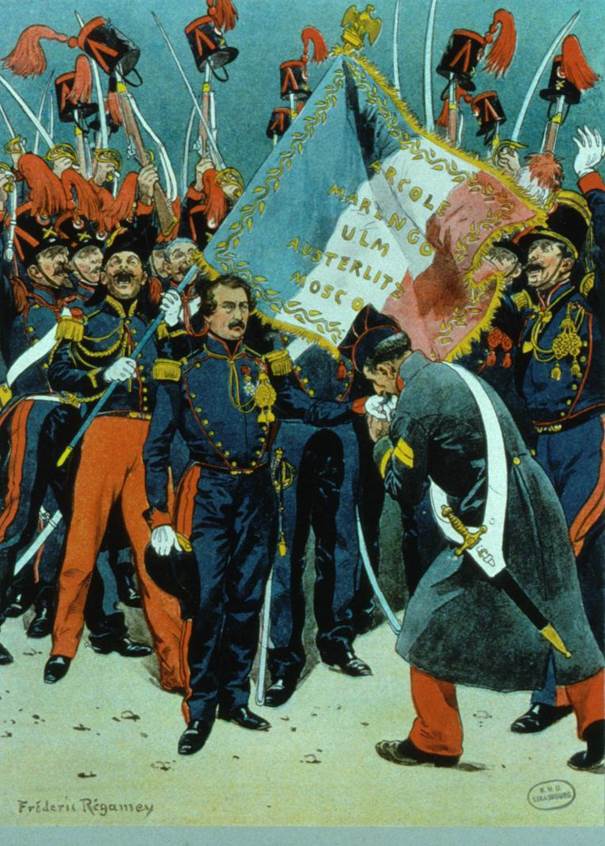
Louis-Napoleon begins his failed coup in Strasbourg in 1836.
In 1836 he tried to start an armed rebellion in Strasbourg, but was arrested and exiled to the United States. Four years later, Louis Napoleon secretly returned to France and attempted to revolt the garrison of Boulogne. Then Louis Philippe I’s patience ran out. The arrested claimant was brought before the court of the House of Peers and sentenced to life imprisonment.

Louis-Napoleon during the failed coup d’état of 1836
He served his sentence in the fortress of Am, from where he escaped to England in 1846 for the amusement of all Europe. But even in prison, the restless character of Louis Napoleon was revealed. He not only managed to become the father of two children, but also wrote several essays on socio-political topics, in which he spoke about the state structure of France.
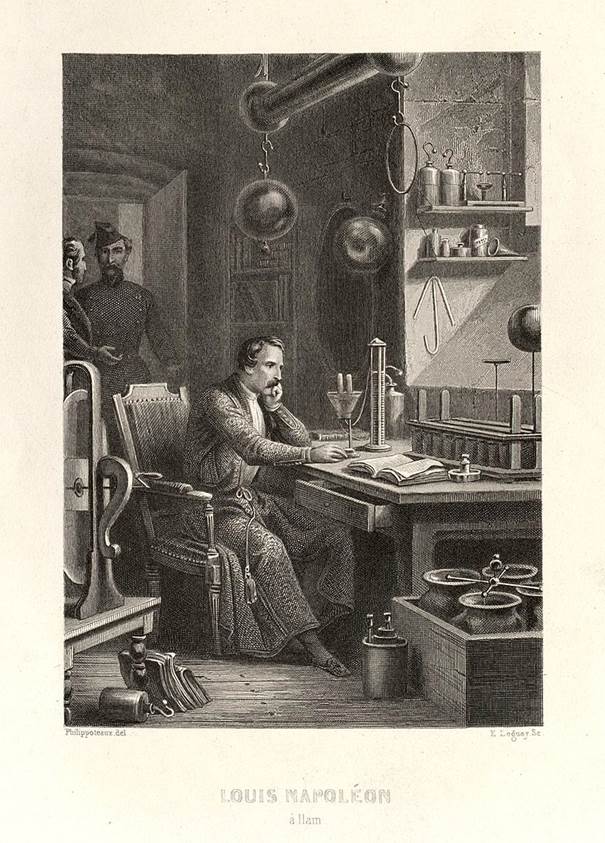
A room in the Ham fortress where Louis Napoleon studied, wrote and conducted scientific experiments. Later, he often referred to what he had learned at the University of Ams.
According to Louis Napoleon, France needed a regime that would combine the best qualities of a monarchy and a republic, cutting off their shortcomings, above all parliamentarism. The parliamentary “talking shop” must be replaced by an authoritative and popular government, which is aimed at economic growth, the improvement of the material conditions of the working classes, and the protection of public morality. This was the program of the Second Empire.

Louis-Napoleon as a member of the National Assembly in 1848. He seldom spoke in the congregation, but because of his name he was very popular in the country.
The Revolution of 1848 allowed Louis Napoleon to return to his homeland and join the political struggle. In this field, he showed exceptional dexterity, achieving election first as a deputy of the Constituent Assembly, and then as President of the Republic.

Louis-Napoleon received 74.2 percent of the vote in France’s first direct presidential election in 1848.
Napoleon the Little was able to outwit all his rivals because he put forward a significant alternative to both the constitutional monarchy and the republic. This alternative was summed up by a deceitful but attractive slogan: “Empire is peace!” The French were foolish enough to take the bait.
Second Empire
The Second Empire was proclaimed on December 10, 1852, and approved by a popular plebiscite. Louis Napoleon Bonaparte took the name of Emperor Napoleon III, considering his predecessor to be the never-reigned son of Napoleon I.

Daguerreotype of Napoleon III in 1850–1855
One of the first concerns of “little Napoleon” was the continuation of the dynasty. In the eyes of European monarchs, Napoleon III was as much an upstart and usurper as his uncle, and his courtship to princesses was out of the question. Therefore, he chose the daughter of the noble Spanish nobleman Count de Montijo, Eugenie. On January 29, 1853, they were married.
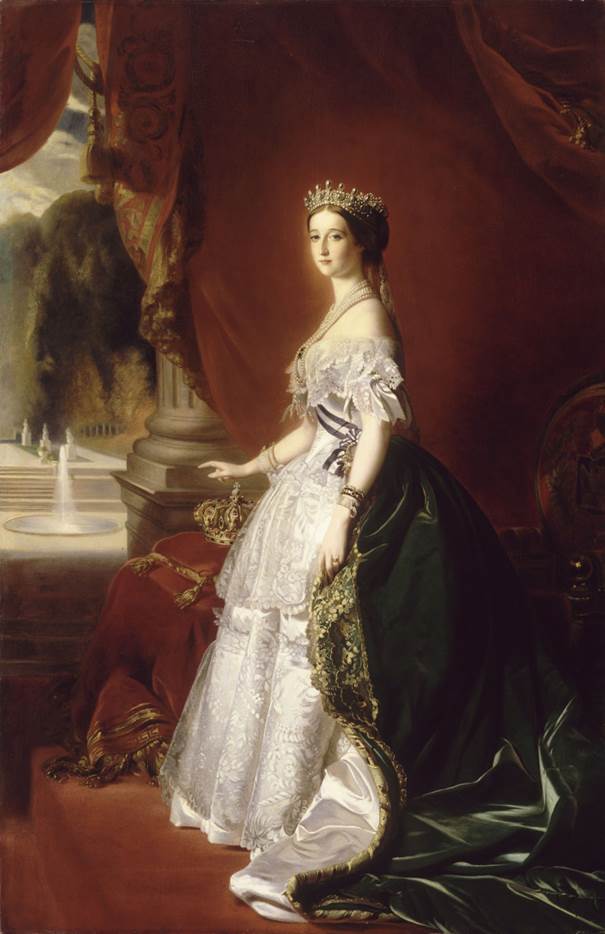
Empress Eugénie in 1853, after her marriage to Napoleon III, painting by Franz Xaver Winterhalter.
Attractive and elegant, the 26-year-old empress could have graced the court. But the rumor was very unfavorable to her: she was reproached for an affair with a childhood friend, a Mexican. It is believed that this played an important role in the fact that France got involved in the civil war in Mexico in the 1960s, in which it killed many of its soldiers and undermined its international standing. The Empress also did not bring peace to the personal life of Napoleon III: frequent family quarrels took place almost in front of the courtiers. However, the reason for them was often given by the emperor himself, who openly cheated on his wife. Nevertheless, in 1856, the long-awaited heir was born to the imperial couple, Prince Napoleon Eugène Louis Jean Joseph.

The Tuileries Palace during the gala evening of June 10, 1867, given by Napoleon III for the sovereigns present at the Paris International Exposition of 1867
Napoleon III was well aware of the importance of economic progress for the stability of the political regime. It is no coincidence that he brought close to him a group of prominent economists and entrepreneurs who contributed to the country’s economic rise.
Yet the main support of the Second Empire was not the business community, but the top of the French army. Napoleon III fully satisfied her thirst for victories, ranks, and awards. His campaign slogan “Empire is peace” in practice meant “Empire is war.” He interfered in Italian affairs, provoked a war with Austria, and sent an expeditionary force to Mexico. But his main mistake was the Crimean War with Russia.
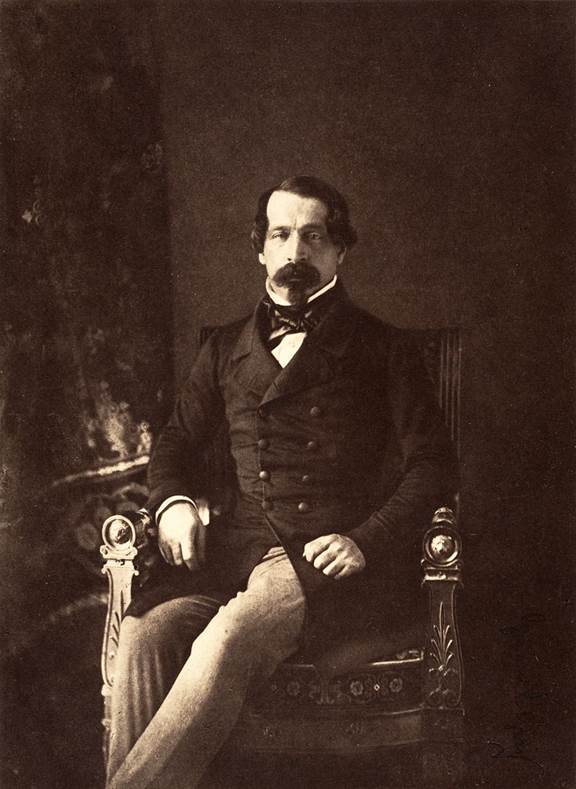
Portrait of Louis-Napoleon (1852) by Gustave Le Gray
As a result, by the end of the 1860s, France found itself in deep foreign policy isolation, and Russia did not interfere with Germany in its showdown with “little Napoleon.”
The Collapse of the Second Empire and the Fate of Bonapartism in France
The rapid unification of Germany under the aegis of belligerent Prussia prompted Napoleon III to take a reckless step. On July 19, 1870, he declared war on Prussia.
A month and a half later, disaster followed.
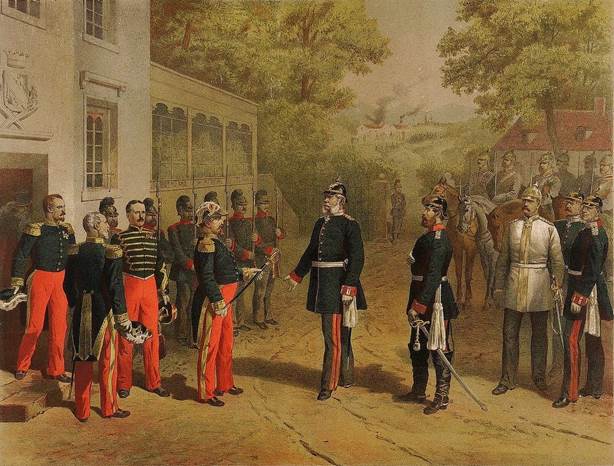
Surrender of Napoleon III after the Battle of Sedan, 1 September 1870
The war exposed the many flaws in the empire’s war machine. The very first battles turned out to be crushing defeats for France. On July 28, Napoleon III left for the army. But his presence at the front did not change anything. Together with the main body of troops under the command of Marshal MacMahon, the Emperor was surrounded in the fortress of Sedan, and on September 2 surrendered to the mercy of the victor. Deprived of its main support in the form of the army, the empire collapsed like a house of cards. Scarcely had news of the Sedan disaster been received than an insurrection broke out in Paris, and on September 4 France was proclaimed a republic.

Napoleon III c. 1870-1871 Looks weakened by rapidly deteriorating health.
Napoleon III spent the last years of his life with his family at Chislehurst Castle near London, where he died in early January 1873, as a result of an unsuccessful operation.

Last photograph of Napoleon III (1872)
Empress Eugenie outlived her husband by almost half a century. She died in 1920. Their only son, Prince Napoleon Eugène Louis, served as an officer in the British colonial forces and died in 1879 in the Zulu War.
Since he left no descendants, the head of the House of Bonaparte was Napoleon III’s cousin, Prince Napoleon Joseph Charles Paul.

Portrait by J.-Yves. Flandren (1860)
But this heir was no longer interested in the throne at all. The same can be said of all his descendants in the direct line. One of them, Louis Napoleon Jérôme Victor, was a member of the Resistance during World War II and earned the right to return to his homeland. From his marriage to Alice de Foresta, he had four children, including his eldest son, Charles Napoleon, who inherited the title of Imperial Prince. However, the heir himself calls himself a Social Democrat, which, however, did not prevent him from marrying Princess Beatrice of Bourbon-Sicily.
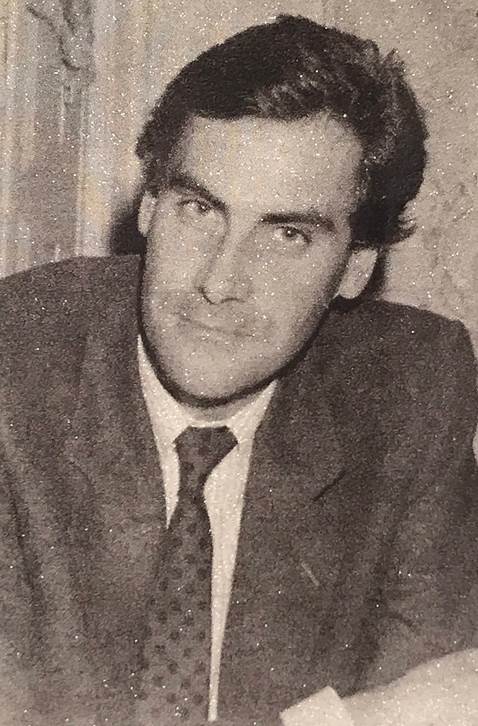
Charles Marie Jérôme Victor Napoleon Bonaparte
Charles Napoleon was vice-mayor of Ajaccio, Corsican, the birthplace of his great ancestor. You can google his other activities on your own.
